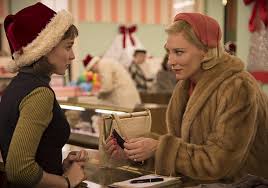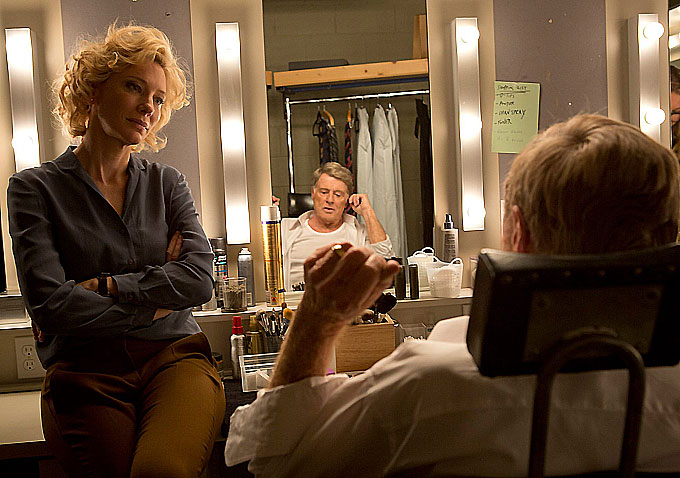Carol
Posted on November 24, 2015 at 5:54 pm

The most romantic movie of the year is “Carol,” based on a novel by Patricia Highsmith, the author of Strangers on a Train and The Talented Mr. Ripley. But Carol, her second novel, was originally published under another title and under another name. It was semi-autobiographical, it was the story of a lesbian relationship, and, unlike the rest of the very limited literature about lesbians at the time, it was not a tragic story. It was almost four decades before Highsmith acknowledged that she was the author.
There is some irony, then, in the idea that this film, depicting a story that was so controversial in the repressed “love that dare not speak its name” mid-century time when it was written is for that very reason ideally suited to depict a romance that is so rich and resonant. Now, when writers complain about how difficult it is to come up with believable ways to keep their characters from having sex in the first act (Stephenie Meyer had to make her male character a vampire for that reason in the Twilight series), making this love affair doubly forbidden by making the couple both women in the conformist 1950’s is the ultimate depiction of the anxious giddiness of being on the brink of falling in love.
The longing. The hesitation. The ecstasy of feeling seen. The harrowing insecurity of feeling seen. The exquisite torture of it all.
This is all gorgeously portrayed in every detail on the screen. Director Todd Haynes, working with an outstanding team of designers and director of photography Edward Lachman tells the story with each setting and camera angle and the flawless performances of the two lead actors, Cate Blanchett in the title role as a wealthy woman in the midst of a divorce and Rooney Mara as Therese, a young shopgirl and would-be photographer.
The intricacy, the precision, and the delicacy of the storytelling allows us to experience the relationship along with the two women. It wisely avoids the usual lazy shortcuts to indicate attraction: the “You love this obscure thing? I love the same obscure thing!” conversation or the montage over a pop song. Instead, the conversational topics are mundane and the responses are not especially witty or incisive. But what we see is that they are good enough for Therese and Carol, and that pulls us in.
Haynes skillfully makes sure that the relationship never seems predatory, even though Carol is older, sophisticated, and wealthy and Therese is young, inexperienced, and vulnerable. Therese herself admits she is so unsure of herself she can hardly figure out what to order for lunch. Haynes and his stars never allow the relationship to seem anything but equally chosen. Even a scene where Carol tries out some make-up on Therese avoids the usual “makeover” trope. When she tells Therese to touch the perfume to her pulse points, we can feel both sets of pulses flutter. The dialogue is often oblique, but its meaning is always true-hearted.
Parents should know that this film includes sexual references and an explicit situation, nudity, some strong language, drinking, smoking, and discussions of divorce, adultery, and custody.
Family discussion: What do we learn from the questions Therese asked Richard? How does this movie illustrate what one character calls the difference between what people say and what they really feel?
If you like this, try: “Far from Heaven” and “Strangers on a Train”



